构词法专题
英语构词法专题

英语构词法专题1、合成法将两个或两个以上的单词合成在一起而构成的新词,叫做合成词。
(1)合成形容词①名词+现在分词例:English-speaking 讲英语的,south-facing 朝南的②名词+过去分词例:man-made 人造的,water-covered 被水覆盖的③名词+形容词例:snow-white 雪白的,day-long 整天的④形容词+名词+-ed 例:warm-hearted 热情的,kind-hearted 好心肠的⑤形容词/副词+现在分词例:good-looking 好看的funny-looking 滑稽的⑥副词+过去分词例:well-known 出名的,deep-set(眼睛)深陷的⑦副词/形容词+名词例:right-hand 右手的,full-time 专职的⑧数词+名词例:100-meter 100米的,million-pound 百万英镑的⑨数词+名词+形容词例:180-foot-high 180英寸高的,10-year-old 10岁的⑩数词+名词+-ed例:four-footed/legged 四脚的,one-eyed 独眼龙的(2)合成名词①名词+名词例:weekend 周末,classroom 教室,bookshop 书店②形容词/介词+名词例:gentleman 绅士,loudspeaker 扬声器③动词+名词例:typewriter 打字机,cookbook 烹调书④名词+动词例:daybreak 破晓,toothpick 牙签⑤动词-ing形式+名词例:reading-room 阅览室,sleeping-car 卧车车厢⑥副词+动词例:outbreak 爆发,downpour 倾盆大雨⑦名词+动名词例:handwriting 笔迹,sun-bathing 日光浴⑧名词+in/to0+名词例:mother-in-law 岳母,brother-in-law 姐夫(3)合成动词①副词+动词例:overthrow 推翻,understand 理解②形容词+动词例:broadcast 广播,whitewash 粉刷③名词+动词例:typewrite 打字,sleepwalk 梦游(4)合成副词①介词+名词例:underfoot 脚下,beforehand 事先②形容词+名词例:hotfoot 匆忙地,someday 有朝一日③形容词+副词例:anywhere 任何地方,outwards 向外(5)合成介词:within在……之内,without没有,inside在……里边,into进入(6)合成代词:myself我自己,ourselves我们自己,anyone任何人,nobody没有人nothing没东西,somebody有人。
构词法专题讲义(解析)
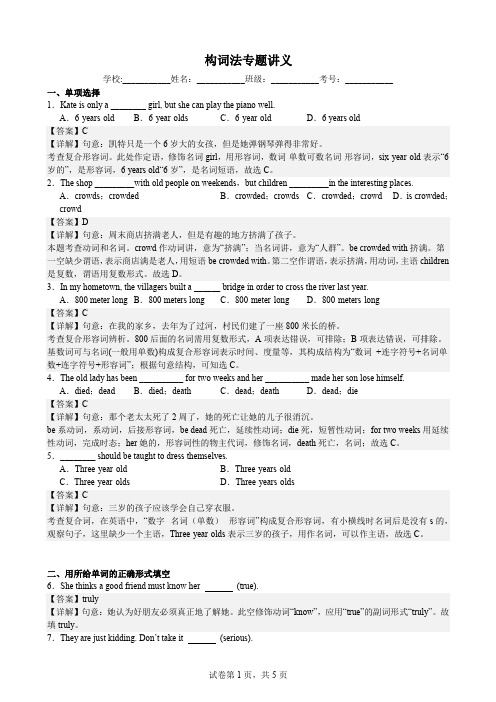
构词法专题讲义学校:___________姓名:___________班级:___________考号:___________一、单项选择1.Kate is only a ________ girl, but she can play the piano well.A.6-years-old B.6-year-olds C.6-year-old D.6 years old【答案】C【详解】句意:凯特只是一个6岁大的女孩,但是她弹钢琴弹得非常好。
考查复合形容词。
此处作定语,修饰名词girl,用形容词,数词-单数可数名词-形容词,six-year-old表示“6岁的”,是形容词,6 years old“6岁”,是名词短语,故选C。
2.The shop _________with old people on weekends,but children _________in the interesting places.A.crowds;crowded B.crowded;crowds C.crowded;crowd D.is crowded;crowd【答案】D【详解】句意:周末商店挤满老人,但是有趣的地方挤满了孩子。
本题考查动词和名词。
crowd作动词讲,意为“挤满”;当名词讲,意为“人群”。
be crowded with挤满。
第一空缺少谓语,表示商店满是老人,用短语be crowded with。
第二空作谓语,表示挤满,用动词,主语children 是复数,谓语用复数形式。
故选D。
3.In my hometown, the villagers built a ______ bridge in order to cross the river last year.A.800 meter long B.800 meters long C.800-meter-long D.800-meters-long【答案】C【详解】句意:在我的家乡,去年为了过河,村民们建了一座800米长的桥。
构词法专题 重要考点及解题技巧

语法专项2——构词法掌握一定的构词法知识,有助于系统扩大词汇量,降低阅读中的生词量,使阅读更流畅。
构词法也是高考语法填空题及改错题的重要考点。
一、三种主要构词法英语主要有三种构词法,即转化法、合成法和派生法。
1. 转化法就是把一个词从一种词类转化为另一种词类。
如:You can water the flowers with dirty water. 你可以用脏水浇花。
2. 合成法就是把两个或两个以上的词结合成一个新词。
如:Few people realized that dustmen were doing an important job.清洁工人3. 派生法就是将一个单词附加前缀或后缀,变为一个新单词。
前缀附加在单词前面,一般不改变原词的词类,但会引起词义的变化。
后缀附加在单词后面,一般不改变原词的基本含义,但会引起词类的变化。
如:We think it impossible to finish the work on time.My grandpa looks very healthy.二、近三年全国III卷高考语法填空及改错构词法考点呈现。
1.语法填空。
(1)(2018) I’m a 66 ______(science) who studied animals such as apes and monkey.(2)(2017) She is determined to carry on with her 66______________________(educate).It is 70___________(certain) fun but the lifestyle is a little unreal.(3)(2016) Food in small pieces could be eaten easily with twigs which 66____________(gradual)turned into chopsticks.Confucius, 67 who lived from roughly 551 to 479 B.C., influence the 68________(develop) of chopsticks.2.改错。
2019年高中英语构词法归纳整理
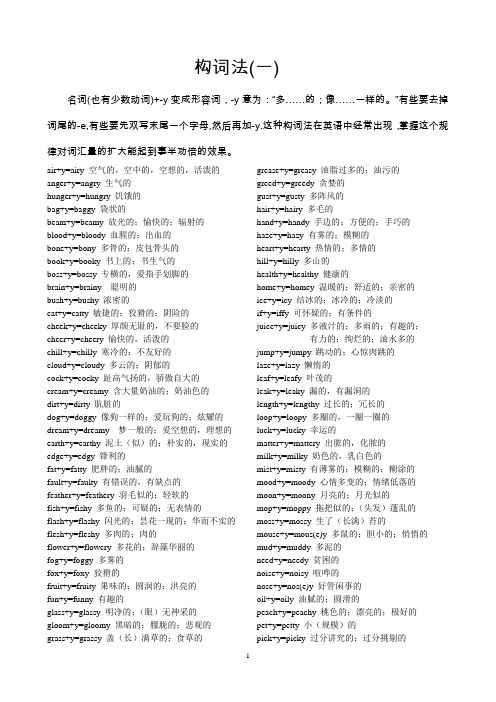
构词法(一)名词(也有少数动词)+-y变成形容词,-y意为:“多……的;像……一样的。
”有些要去掉词尾的-e,有些要先双写末尾一个字母,然后再加-y.这种构词法在英语中经常出现,掌握这个规律对词汇量的扩大能起到事半功倍的效果。
air+y=airy 空气的,空中的,空想的,活泼的anger+y=angry 生气的hunger+y=hungry 饥饿的bag+y=baggy 袋状的beam+y=beamy 放光的;愉快的;辐射的blood+y=bloody 血腥的;出血的bone+y=bony 多骨的;皮包骨头的book+y=booky 书上的;书生气的boss+y=bossy 专横的,爱指手划脚的brain+y=brainy 聪明的bush+y=bushy 浓密的cat+y=catty 敏捷的;狡猾的;阴险的cheek+y=cheeky 厚颜无耻的,不要脸的cheer+y=cheery 愉快的,活泼的chill+y=chilly 寒冷的;不友好的cloud+y=cloudy 多云的;阴郁的cock+y=cocky 趾高气扬的,骄傲自大的cream+y=creamy 含大量奶油的;奶油色的dirt+y=dirty 肮脏的dog+y=doggy 像狗一样的;爱玩狗的;炫耀的dream+y=dreamy 梦一般的;爱空想的,理想的earth+y=earthy 泥土(似)的;朴实的,现实的edge+y=edgy 锋利的fat+y=fatty 肥胖的;油腻的fault+y=faulty 有错误的,有缺点的feather+y=feathery 羽毛似的;轻软的fish+y=fishy 多鱼的;可疑的;无表情的flash+y=flashy 闪光的;昙花一现的;华而不实的flesh+y=fleshy 多肉的;肉的flower+y=flowery 多花的;辞藻华丽的fog+y=foggy 多雾的fox+y=foxy 狡猾的fruit+y=fruity 果味的;圆润的;洪亮的fun+y=funny 有趣的glass+y=glassy 明净的;(眼)无神采的gloom+y=gloomy 黑暗的;朦胧的;悲观的grass+y=grassy 盖(长)满草的;食草的grease+y=greasy 油脂过多的;油污的greed+y=greedy 贪婪的gust+y=gusty 多阵风的hair+y=hairy 多毛的hand+y=handy 手边的;方便的;手巧的haze+y=hazy 有雾的;模糊的heart+y=hearty 热情的;多情的hill+y=hilly 多山的health+y=healthy 健康的home+y=homey 温暖的;舒适的;亲密的ice+y=icy 结冰的;冰冷的;冷淡的if+y=iffy 可怀疑的;有条件的juice+y=juicy 多液汁的;多雨的;有趣的;有力的;绚烂的;油水多的jump+y=jumpy 跳动的;心惊肉跳的laze+y=lazy 懒惰的leaf+y=leafy 叶茂的leak+y=leaky 漏的,有漏洞的length+y=lengthy 过长的;冗长的loop+y=loopy 多圈的,一圈一圈的luck+y=lucky 幸运的matter+y=mattery 出脓的,化脓的milk+y=milky 奶色的,乳白色的mist+y=misty 有薄雾的;模糊的;糊涂的mood+y=moody 心情多变的;情绪低落的moon+y=moony 月亮的;月光似的mop+y=moppy 拖把似的;(头发)蓬乱的moss+y=mossy 生了(长满)苔的mouse+y=mous(e)y 多鼠的;胆小的;悄悄的mud+y=muddy 多泥的need+y=needy 贫困的noise+y=noisy 喧哗的nose+y=nos(e)y 好管闲事的oil+y=oily 油腻的;圆滑的peach+y=peachy 桃色的;漂亮的;极好的pet+y=petty 小(规模)的pick+y=picky 过分讲究的;过分挑剔的pig+y=piggy 猪一般的;肮脏的;贪婪的pine+y=piny 松林(似)的;丛生的pocket+y=pockety 袋状分布的;分布不匀的price+y=pric(e)y 价格高昂的rain+y=rainy 多雨的rat+y=ratty 多鼠的;(像)老鼠的;破烂的reed+y=reedy 多芦苇的reek+y=reeky 烟雾迷漫的risk+y=risky (爱)冒险的rock+y=rocky 多岩石的room+y=roomy 宽敞的,有很多空间的rose+y=rosy 玫瑰红的;红润的;乐观的rust+y=rusty 生锈的;变迟钝的;陈旧的salt+y=salty 咸的;风趣的;老练的;泼辣的sand+y=sandy 多沙的;沙质的seed+y=seedy 多籽(核)的;成熟的sex+y=sexy 性感的scare+y=scar(e)y 惊慌的;胆小的;骇人的shade+y=shady 阴凉的shadow+y=shadowy 多荫的;有影的shake+y=shaky 摇晃的;不稳定的;有病的shell+y=shelly 多贝壳的;有壳的shine+y=shiny 晴朗的;发亮的show+y=showy 炫耀的;显眼的;艳丽的shower+y=showery 多阵雨的;阵雨(般)的silk+y=silky 丝绸般的;奉承讨好的silver+y=silvery 银色的;(声音)清脆的skin+y=skinny 皮包骨头的sleep+y=sleepy 想睡的;困乏的;懒散的;寂静的smell+y=smelly 难闻的smoke+y=smoky 多烟的;烟状的sneak+y=sneaky 偷偷摸摸的,鬼鬼祟祟的snow+y=snowy 多雪的;雪白的speed+y=speedy 迅速的sponge+y=spongy 海绵似的sport+y=sporty 像运动员的;花哨的star+y=starry 布满星辰的steam+y=steamy (似)蒸汽的;多蒸汽的stick+y=sticky 粘性的stone+y=ston (e)y 多石头的;冷酷的storm+y=stormy 多风暴的;烈性子的;激烈的sun+y=sunny 阳光灿烂的,晴朗的summer+y=summery (如)夏季的;适合夏季的sweat+y=sweaty 汗湿透的;吃力的taste+y=tasty 好吃的,可口的thorn+y=thorny 多刺的,棘手的thread+y=thready 纤细(无力)的;丝状的;tooth+y=toothy 多齿的;露齿的trick+y=tricky 狡猾的;困难的touch+y=touchy 棘手的water+y=watery 多水的;水汪汪的;淡的wave+y=wavy 多浪的;波动的wax+y=waxy 蜡制的;涂蜡的;似蜡的;苍白的wealth+y=wealthy 富裕的web+y=webby丝网的;由丝网组成的weed+y=weedy 杂草丛生的wind+y=windy 多风的;狂暴的wine+y=winy 像酒的;醉态的;(空气)清新的winter+y=wintery 冬天般的,寒冷的word+y=wordy 多言的;冗长的构词法(二)-age:行为及其结果,动作的结果,场所,情况,总称,身份。
构词法(17张PPT)初中英语专项复习课件

13. ___L_u_c_k_i_ly(lucky), the 8th grade students in Changsha had a chance to work and study at the Social Practice Base in Lianhua Town. There, students learned to care about others and do outdoor physical practice in groups.
一、用所给单词的正确形式填空 1. The south of China was _b_a_d__ly___(bad) affected by the rainstorm a short time ago. 2. Daniel often feels __s_le_e_p_y__(sleep) in class because he stays up late to do his homework every night. 3. We are not sure what caused the young girl’s _s_a_d_n_e_s_s_(sad). 4. Computers are an important _i_n_v_e_n_ti_o_n_(invent) for humans.
re self under over
再;又 自己;本身 在……下面 太多;过分
rethink, retell, recycle selfconfident, selfcontrol underline, underground overwork, oversize
(2)后缀
类别
后缀及含义
er, or, ess(女性) “人”
高三英语构词法重点专题构词法归纳知识点分析
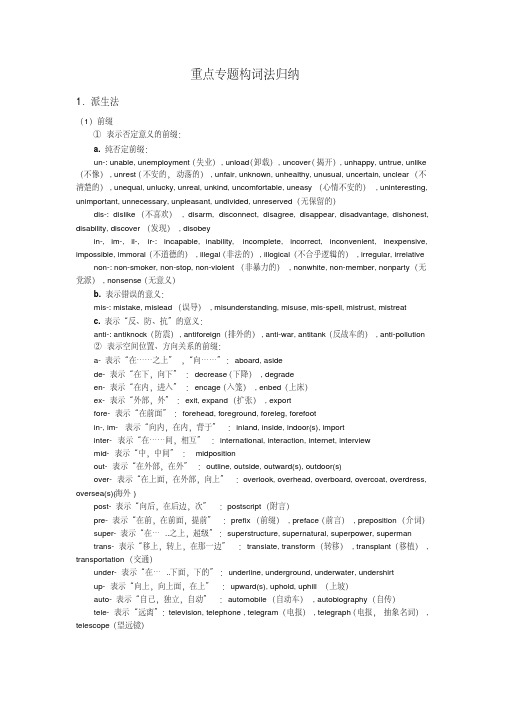
重点专题构词法归纳1.派生法(1)前缀①表示否定意义的前缀:a. 纯否定前缀:un-: unable, unemployment(失业), unload(卸载), uncover(揭开), unhappy, untrue, unlike (不像), unrest(不安的,动荡的), unfair, unknown, unhealthy, unusual, uncertain, unclear(不清楚的), unequal, unlucky, unreal, unkind, uncomfortable, uneasy(心情不安的), uninteresting, unimportant, unnecessary, unpleasant, undivided, unreserved(无保留的)dis-: dislike(不喜欢), disarm, disconnect, disagree, disappear, disadvantage, dishonest, disability, discover(发现), disobeyin-, im-, il-, ir-: incapable, inability, incomplete, incorrect, inconvenient, inexpensive, impossible, immoral(不道德的), illegal(非法的), illogical(不合乎逻辑的), irregular, irrelative non-: non-smoker, non-stop, non-violent(非暴力的), nonwhite, non-member, nonparty(无党派), nonsense(无意义)b. 表示错误的意义:mis-: mistake, mislead(误导), misunderstanding, misuse, mis-spell, mistrust, mistreatc. 表示“反、防、抗”的意义:anti-: antiknock(防震), antiforeign(排外的), anti-war, antitank(反战车的), anti-pollution②表示空间位置、方向关系的前缀:a- 表示“在……之上”,“向……”:aboard, asidede- 表示“在下,向下”:decrease(下降), degradeen- 表示“在内,进入”:encage(入笼), enbed(上床)ex- 表示“外部,外”:exit, expand(扩张), exportfore- 表示“在前面”:forehead, foreground, foreleg, forefootin-, im- 表示“向内,在内,背于”:inland, inside, indoor(s), importinter- 表示“在……间,相互”:international, interaction, internet, interviewmid- 表示“中,中间”:midpositionout- 表示“在外部,在外”:outline, outside, outward(s), outdoor(s)over- 表示“在上面,在外部,向上”:overlook, overhead, overboard, overcoat, overdress, oversea(s)(海外)post- 表示“向后,在后边,次”:postscript(附言)pre- 表示“在前,在前面,提前”:prefix(前缀), preface(前言), preposition(介词)super- 表示“在…..之上,超级”:superstructure, supernatural, superpower, superman trans- 表示“移上,转上,在那一边”:translate, transform(转移), transplant(移植), transportation(交通)under- 表示“在…..下面,下的”:underline, underground, underwater, undershirtup- 表示“向上,向上面,在上”:upward(s), uphold, uphill(上坡)auto- 表示“自己,独立,自动”:automobile(自动车), autobiography(自传)tele- 表示“远离”:television, telephone , telegram(电报), telegraph(电报,抽象名词), telescope(望远镜)③表示时间,序列关系的前缀:fore- 表示“在前面,先前,前面”:foreword(前言), forecast(预报), foretell(预言), foresee(预见), foreknow(先知), foreknowledge(先知)mid- 表示“中,中间”:midnight, midsummer, mid-day, mid-autumnpost- 表示“在后,后”:postwar, postgraduate(研究生), postdatepre- 表示“在前,事先,预先”:preheat, prewar, prehistory(史前), preview(预习), prebattle, prepayre- 表示“再一次,重新”:retell(复述), rewrite, renew(续借), reconsider, reuse, remarry, recycle(回收利用), rebuild④表示比较程度差别关系的前缀:by- 表示“副,次要的”:byproduct(副产品), bywork(副业)extra- 表示“超越,额外”:extraordinaryover- 表示“超过,过度,太”:overeat(吃过多), oversleep(睡过头), overpraise(过奖), overwork, overact(行为过分), overdounder- 表示“低劣,低下”:undersize, undergrown, underproduction(生产不足)vice- 表示“副,次”:vice-president, vice -chairman⑤表示共同,相等意思的前缀:co- 表示“共同,一起”:coexist(共同生存), co-operate, co-worker, coactions(合作行动), coauthor(合作作者)⑥表示某种状态,构成形容词、副词或动词:a- afraid, alive, alone, asleep, ashamed, aloud, ahead, aside, alike, awake⑦表示分离,离开意思的前缀:a- 表示“分离,离开”:away, apartde- 表示“离去,处去”:depart, decolour⑧表示“自我”:self- self-protect(ion), self-made, self-knowledge⑨表示变换词类作用的前缀:be- befrienden- enslave, enable, enrich, enlarge, encourage⑩表示数量关系的前缀:a. 表示“单一”,“一”:uni- uniform(统一服装), unicellular(单细胞)b. 表示“二,两,双”:bi- bicycletwi- twilightc. 表示“半,一半”:semi- semiconductor(半导体), semicircle(半圆), semimonthly(半月刊), semifinal (半决赛)d. 表示“百,百分之一”:centi- centimetere. 表示“千,千分之一”:kilo- kilometer, kilogram, kilowattf. 表示“微小”:micro- microvolt(微伏特), microcomputer(微机), microscope(显微镜)g. 表示“许多,复,多数”:multi- multimedia(多媒体), multicolored, multiform, multinaturalh. 表示“千分之一、毫”:milli- millimeter, milligrami. 表示“微小、微型”:mini- minibus, miniskirt, minipark(2)后缀①名词后缀:a. 具有某种职业或动作的人:-an, -ian, -ician 表示“……地方的人,精通……的人”:American, Asian, Australian, Russian, Italian , historian, librarian, electrician, magician(魔术师), technician, musician, politician(政客), physician(内科医生),-ant,-ent 表示“……人”:merchant, servant, assistant, agent, student,-ee 表示“动作承受者”:employee(雇员), examinee, payee(收款人), interviewee -eer 表示“从事于……人”:engineer, volunteer(志愿者)-er 表示“从事某种职业的人, 某地区,地方的人”:banker, observer, Londoner, villager singer, driver, writer, speaker, traveller, buyer-or 表示“……者”:author, doctor, operator, actor, visitor, inventor, educator-ar, -ary 表示“……的人, 从事……的人”:scholar, liar, beggar, secretary, missionary -ese 表示“……国人,……地方的人”:Chinese, Japanese, Cantonese(广东人)-ess 表示“阴性人称名词”:actress(女演员), hostess(女主人), manageress(女经理)-ist 表示“从事……研究者,信仰……主义者”:pianist, communist, dentist, artist, chemist, socialist, typist, receptionist-icist 表示“……家,……者, ……能手”:physicist, phoneticist(语音学家), technicist -logist 表示“……学家,研究者”:biologist, geologist(地质学家)b. 构成具有抽象名词的含义:-age 表示“状态,行为,身份及其结果,总称”:courage, storage, marriage, percentage -al 表示“事物的动作,过程”:refusal, arrival, survival, denial, approval, trial, burial-ance, -ence 表示“性质,状况,行为,过程,总量,程度”:importance, distance, avoidance, appearance, performance, diligence, difference, obedience, absence, presence(出席), existence -ancy, -ency 表示“性质,状态,行为,过程”:frequency(频繁), urgency(紧急), efficiency (高效率),-ity 表示“性质,状态,程度”:purity, reality, equality-bility 表示“动作,性质,状态”:ability, possibility, probability, responsibility-dom 表示“等级,领域,状态”:freedom, kingdom, wisdom-ery, -ry 表示“行为,状态,习性,性质”:bravery, slavery-hood 表示“资格,身份, 年纪,状态”:childhood, girlhood, boyhood, manhood-ice 表示“行为,性质,状态”:notice, justice, service-ing 表示“动作的过程,结果”:building, writing, learning-ion, -ation, -ition, -sion 表示“行为的过程,结果,状况”:suggestion, action, solution, invention, direction, correction, collection, instruction, destruction, introduction, congratulation, dictation, invitation, pronunciation, examination, graduation, operation, education, information, translation, starvation, satisfaction, relation, irrigation, determination, preparation, imagination, explanation, opposition, competition, description, decision, division, conclusion, explosion,impression, expression, admission, permission, discussion-ment 表示“行为,状态,过程,手段及其结果”:disappointment, treatment, movement, judgment, punishment, argument, agreement, government, development, improvement, requirement, astonishment, encouragement-ness 表示“性质,状态,程度”:goodness, kindness, tiredness, friendliness, business, illness, happiness, goodness, willingness, weakness, fairness-ism 表示“制度,主义,学说,信仰,行为”:socialism, criticism, heroism, tourism, communism(共产主义), Marxism(马克思主义)-ship 表示“情况,性质,技巧,技能及身份,职业”:hardship, relationship, membership, friendship, seamanship, ownership, scholarship, professorship-th, 表示“动作,性质,过程,状态”:strength, length, width, depth, wealth, truth, growth, warmth, youth-ure 表示“行为,结果”:exposure(暴露), pressure, failure, procedure(手续), mixture -craft 表示“工艺”:aircraft, needlecraft, woodcraftc. 带有场所,地方的含义:-age 表示“住所,地点”:village, cottage-ary 表示“住所,场地”:library, granary (谷仓)-ory 表示“工作场所,住处”:factory, dormitory, laboratory, observatory②形容词后缀:a. 带有“属性,倾向,相关”的含义:-able, -ible: movable, comfortable, eatable, enjoyable, acceptable, reasonable, applicable, visible, responsible, terrible, horrible-al: natural, additional, educational, national-ant, -ent: distant, important, excellent-ing(表示特征:令人觉得): moving, touching, daring, interesting, exciting, disappointing , astonishing, boring, amazing-ed(表示情绪:觉得): pleased, interested, surprised, worried, excited, bored, determined, delighted-ish: foolish, bookish, selfish-ive: active, impressive, decisive, active, instructive, expensive, progressiveb. 表示“相象,类似”的含义:-ish: boyish, childish-like: manlike, childlike-some: troublesome, handsome-y: milky, cloudy sunny, windy, rainy, foggy, healthy, wealthy, worthy, bloody, funny, dirty, lucky, noisy, salty, smelly, hilly-ly: manly, fatherly, motherly, sisterly, brotherly, daily, weekly, monthly, quarterly, yearly, friendly, lonely, orderly, lovely, lively, likely, scholarlyc. 表示“充分的”含义:-ful: beautiful, wonderful, helpful, truthful, successful, harmful, useful, careful, forgetful, merciful-ous: dangerous, courageous, nervous, mountainous, humorous, variousd. 表示由某种物质形成,制成或生产的含义:-en: wooden, golden, woolene. 表示方向的含义:-ern: eastern, western, southern, northern, southeastern, northwestern-ward: downward, forwardf. 表示“数量关系”的含义:-teen: thirteen-ty: fifty-th: fourth, fiftiethg. 表示国籍,语种,宗教的含义:-an: Roman, European-ese: Chinese, Japanese-ish: English, Spanishh. 表示否定:-less: countless, stainless(不锈的), wireless, useless, endless, priceless(无价的,贵重的), hopeless③动词后缀:-ize, ise 表示“做成,变成,……化”:modernize(现代化), democratize(民主化), organize, apologize, realize-en 表示“使成为,引起,使有”:quicken, weaken, soften, harden-fy 表示“使……化, 使成”:beautify, purify(净化), intensify, signify, simplify(简化), satisfy④副词后缀:-ly: possibly, swiftly, simply-ward(s): downward, inwards, upward-ways: always, sideways-wise: otherwise, clockwise注意:有的单词有双重后缀,如:use(用途)→useless(无用的)→uselessness(无用)self(自己)→selfish(自私的)→selfishness(自私)有的单词则是前后缀同时使用,如:important→importance→unimportanceregular(有规律的,有规则的)→irregular(无规律的,不规则的)→irregularity(无规律,不规则)2.合成法(1)合成名词boyfriend, girlfriend, bus-driver, necklace, playground, radioactive, headmaster, sunshine, notebook, armchair, wheelchair, postcard, football, spaceship, blackboard, firefighter, fireman, gateman, chairman, weatherman, businessman, armyman, postman, sportsman, bedroom, reading-room, classroom, newspaper, pickpocket(扒手), she-goat(雌性山羊), editor-in-chief (主编), daybreak(破晓), handshake(握手), silkworm(蚕), outbreak(爆发)(2)合成形容词名词+动词过去分词:man-made, homemade副词+动词过去分词:well-known, newly-built(新建的)形容词+名词ed:kind-hearted, cold-blooded数词+名词ed:five-storeyed(五层楼的), four-legged(四条腿的)名词+动词现在分词:English-speaking, Chinese-speaking, brainwashing(洗脑的)由三个词构成的合成形容词:face-to-face, heart-to-heart, two-year-old, eight-metre-long 其他合成形容词:everyday(日常的), faraway(遥远的), snow-white(雪白的), lay-off (下岗的)3.转化法(1)名词→动词hand(手→传递)back(背部,后面→支持,后退)charge(费用→收费)copy(抄本,复印件→抄写,复印)flood(洪水→淹没)heat(热量→加热)paint(油漆→刷漆)phone(电话→打电话)pin(别针→装订)waste(废物→浪费)face(脸→面对)use(用途→使用)interest(兴趣→使兴趣)surprise(惊讶→使惊讶)taste(味道→品尝)smell(气味→闻)break(短暂休息→折断)present(礼物→赠送)(2)形容词→动词clean(干净→使干净,打扫)clear(清楚→清理)dirty(脏→弄脏)dry(干燥→烘干,晒干)empty(空的→倒空)free(自由→使自由,释放)slow(慢的→放慢)warm(暖和→使暖和)cool(凉的→冷却)quiet(安静→使安静)。
高中英语专题-构词法

构词法英语构词法种类英语构词法主要有:合成法,转化法,派生法,混成法,截短法和词首字母缩略法。
定义与精讲1.合成:两个单词连在一起合成一个新词,前一个词修饰或限定后一个词。
(1)名词+名词sunlight 阳光handbag手提包(2)形容词+名词blackboard黑板darkroom 暗室(3)副词/介词+名词afternoon 下午uproar 喧嚣(4)动词+名词postcard 明信片pickpocket扒手(5)名词+动名词sightseeing 观光handwriting 书法(6)动词+副词get-together聚会break-through突破(7)其他方式构成的合成名词passer-by 过路人grown-up成年人合成形容词的主要构成方式(1)名词+形容词snow-white雪白的world-famous 世界闻名的(2)形容词+名词open-air 户外的old-style 旧式的(3)名词/形容词+名词+-edkind-hearted 好心的blue-eyed 蓝眼睛的(4)名词/形容词/副词+现在分词good-looking 好看的well-written 写得好的合成动词的主要构成方式(1)名词+动词sunbathe 晒日光浴typewrite 打字(2)副词+动词underline 画底线标出overcome 克服(3)形容词+动词blacklist 将……列入黑名单whitewash 用石灰水把……刷白1)有些合成词保留了原来两个单词的意思。
keyword 关键词toothache 牙痛2)有些合成词与原来两个单词的意思区别很大。
eggplant 茄子parkway 驾车专用道注意:2.派生:是通过在词根上加前缀或者后缀构成一个新词。
前缀: 词根加前缀多数不改变词性,只改变词义。
(1)表示相反意义的前缀有:un-,in-,im-,il-,ir-,non-,dis-,mis-等。
2025届高考英语二轮复习备考专项冲刺专题03构词法含解析

专题03 【构词法】解题指导·触类旁通寻方法,求策略,驾驭“套路”厘清两种状况,突破词性转换一、从句法功能上看,厘清“修饰与被修饰”1.名词在句中作宾语,放在冠词、形容词或形容词性物主代词之后。
【例1】(2024·全国卷Ⅲ)She is determined to carry on with her ____________(educate).【分析】education 前面有形容词性物主代词her,此处应当运用动词educate的名词形式education作宾语。
【例2】(全国卷Ⅲ)Some people think that the great Chinese scholar Confucius, who lived from roughly 551 to 479 B.C., influenced the ____________(develop) of chopsticks.【分析】development 依据空前面的the和空后面的of可知,此处需用名词。
2.形容词在句中作定语,常放在名词之前。
【例3】(2024·全国卷Ⅰ)It was a relief and I cam e to a suddenly stop just in the middle of the road.____________________【分析】suddenly→sudden此处须要用形容词修饰后面的名词stop,表示“突然的停止”。
3.形容词在句中作表语,常放在be, get, become, remain等系动词后。
【例4】(全国卷Ⅲ)At one time, I even felt my parents couldn’t understand me so I hoped I could be freely from them.____________________【分析】freely→free此处须要用形容词作表语。
英语构词法大全
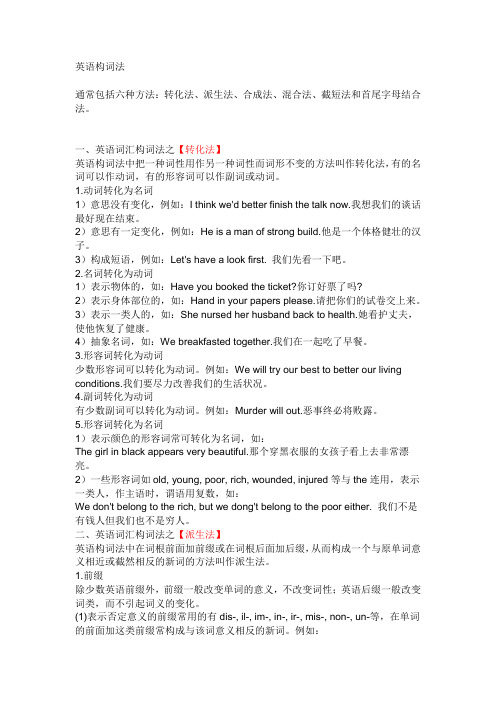
英语构词法通常包括六种方法:转化法、派生法、合成法、混合法、截短法和首尾字母结合法。
一、英语词汇构词法之【转化法】英语构词法中把一种词性用作另一种词性而词形不变的方法叫作转化法,有的名词可以作动词,有的形容词可以作副词或动词。
1.动词转化为名词1)意思没有变化,例如:I think we'd better finish the talk now.我想我们的谈话最好现在结束。
2)意思有一定变化,例如:He is a man of strong build.他是一个体格健壮的汉子。
3)构成短语,例如:Let's have a look first. 我们先看一下吧。
2.名词转化为动词1)表示物体的,如:Have you booked the ticket?你订好票了吗?2)表示身体部位的,如:Hand in your papers please.请把你们的试卷交上来。
3)表示一类人的,如:She nursed her husband back to health.她看护丈夫,使他恢复了健康。
4)抽象名词,如:We breakfasted together.我们在一起吃了早餐。
3.形容词转化为动词少数形容词可以转化为动词。
例如:We will try our best to better our living conditions.我们要尽力改善我们的生活状况。
4.副词转化为动词有少数副词可以转化为动词。
例如:Murder will out.恶事终必将败露。
5.形容词转化为名词1)表示颜色的形容词常可转化为名词,如:The girl in black appears very beautiful.那个穿黑衣服的女孩子看上去非常漂亮。
2)一些形容词如old, young, poor, rich, wounded, injured等与the连用,表示一类人,作主语时,谓语用复数,如:We don't belong to the rich, but we dong't belong to the poor either. 我们不是有钱人但我们也不是穷人。
(完整版)英语构词法详解及练习
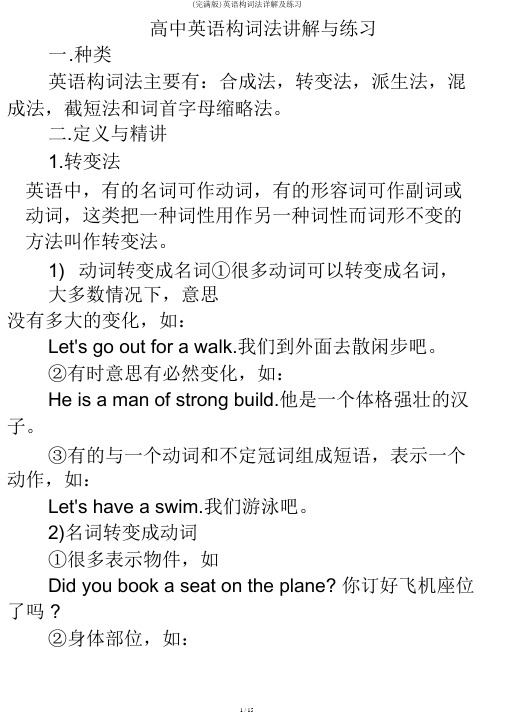
高中英语构词法讲解与练习一.种类英语构词法主要有:合成法,转变法,派生法,混成法,截短法和词首字母缩略法。
二.定义与精讲1.转变法英语中,有的名词可作动词,有的形容词可作副词或动词,这类把一种词性用作另一种词性而词形不变的方法叫作转变法。
1)动词转变成名词①很多动词可以转变成名词,大多数情况下,意思没有多大的变化,如:Let's go out for a walk.我们到外面去散闲步吧。
②有时意思有必然变化,如:He is a man of strong build.他是一个体格强壮的汉子。
③有的与一个动词和不定冠词组成短语,表示一个动作,如:Let's have a swim.我们游泳吧。
2)名词转变成动词①很多表示物件,如Did you book a seat on the plane? 你订好飞机座位了吗 ?②身体部位,如:Please hand me the book请.把那本书递给我。
③某类人的名词可以用作动词来表示动作,如:Shenursed her husband back to health她.看护丈夫,使他恢复了健康。
④某些抽象名词也可作动词。
如:We lunched together我.们在一起吃了午餐。
3)形容词转变成动词有少许形容词可以转变成动词。
如:We will try our best to better our living conditions.我们要全力改进我们的生活情况。
4)副词转变成动词有少许副词可以转变成动词。
比方:Murder will out.( 谚语 )恶事终必然败事。
5)形容词转变成名词①表示颜色的形容词常可转变成名词,如:You should be dressed in black at the funeral.你在葬礼中该穿黑色衣服②某些形容词如 old, young, poor, rich, wounded, injured 等与 the 连用,表示一类人,作主语时,谓语用复数以下,如:The old in our village are living a happy life. 我们村的老年人过着幸福的生活。
语法专题 专题十三 构 词 法(共30张PPT)

综合演练
-ese China→Chinese 中国人 -ian history→historian 历史学家 -ist tour→tourist 旅行者;观光者 -ant serve→servant 仆人 -ance/-ence appear→appearance 出现;外貌 -ing hear→hearing 听力;听觉 -ure/-ture press→pressure 压力
综合演练
always familiar, to round out my skills and knowledge. Risks come 4 every form, and throughout your career; taking risks could mean 5 (choose) to learn new areas of your business or simply putting your hand up to start new projects. Each one 6 (broaden) your skills and improve your knowledge while getting you 7 (close) to reaching your full potential.
综合演练
Ⅲ. 语法填空 阅读下面材料,在空白处填入 1 个适当的单词或括号内单词的正确形
式。 Ask my kids to pick one word that describes me? They would likely say
“adventurous” according to what I 1 (do) in the past. I believe in taking risks and growing every day, in life and in business. I take part in outdoor adventures not only to spend time with my family, but also to learn more about myself 2 put in unfamiliar situations and environments. In business, I've always challenged myself by taking on new roles, in areas 3 I wasn't
七种构词法及例子
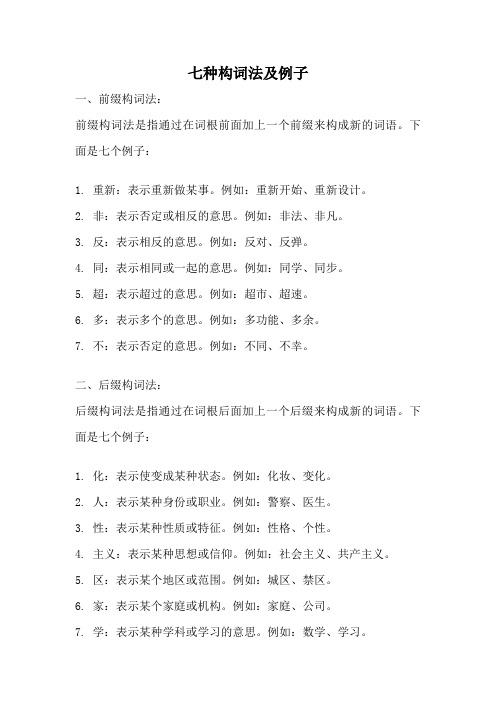
七种构词法及例子一、前缀构词法:前缀构词法是指通过在词根前面加上一个前缀来构成新的词语。
下面是七个例子:1. 重新:表示重新做某事。
例如:重新开始、重新设计。
2. 非:表示否定或相反的意思。
例如:非法、非凡。
3. 反:表示相反的意思。
例如:反对、反弹。
4. 同:表示相同或一起的意思。
例如:同学、同步。
5. 超:表示超过的意思。
例如:超市、超速。
6. 多:表示多个的意思。
例如:多功能、多余。
7. 不:表示否定的意思。
例如:不同、不幸。
二、后缀构词法:后缀构词法是指通过在词根后面加上一个后缀来构成新的词语。
下面是七个例子:1. 化:表示使变成某种状态。
例如:化妆、变化。
2. 人:表示某种身份或职业。
例如:警察、医生。
3. 性:表示某种性质或特征。
例如:性格、个性。
4. 主义:表示某种思想或信仰。
例如:社会主义、共产主义。
5. 区:表示某个地区或范围。
例如:城区、禁区。
6. 家:表示某个家庭或机构。
例如:家庭、公司。
7. 学:表示某种学科或学习的意思。
例如:数学、学习。
三、合成构词法:合成构词法是指通过将两个或多个词根结合在一起形成新的词语。
下面是七个例子:1. 电脑:由“电”和“脑”两个词根组成,表示一种用电做计算的机器。
2. 高速:由“高”和“速”两个词根组成,表示速度很快的意思。
3. 机器人:由“机器”和“人”两个词根组成,表示一种能够模仿人类行为的机器。
4. 电话:由“电”和“话”两个词根组成,表示通过电线传递声音的通信工具。
5. 自行车:由“自行”和“车”两个词根组成,表示人力驱动的两轮交通工具。
6. 火车:由“火”和“车”两个词根组成,表示以蒸汽或电力为动力的铁路交通工具。
7. 地球:由“地”和“球”两个词根组成,表示地球这个星球。
四、转化构词法:转化构词法是指通过改变词性或词类的方式构成新的词语。
下面是七个例子:1. 打:从动词转化为名词,表示击打的动作或声音。
例如:一打、拳打脚踢。
2. 红:从形容词转化为名词,表示红色。
专题05构词法(讲义)
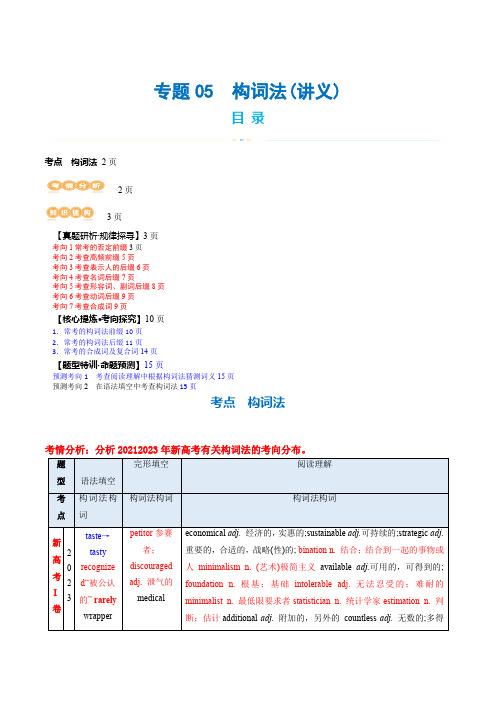
专题05 构词法(讲义)目录考点构词法2页2页3页【真题研析·规律探寻】3页考向1常考的否定前缀3页考向2考查高频前缀5页考向3考查表示人的后缀6页考向4考查名词后缀7页考向5考查形容词、副词后缀8页考向6考查动词后缀9页考向7考查合成词9页【核心提炼·考向探究】10页1.常考的构词法前缀10页2.常考的构词法后缀11页3.常考的合成词及复合词14页【题型特训·命题预测】15页预测考向1 考查阅读理解中根据构词法猜测词义15页预测考向2 在语法填空中考查构词法15页考点构词法考情分析:分析20212023年新高考有关构词法的考向分布。
近年来,高考对构词法的考查越来越多,2023年的阅读理解中出现的最多,这足以说明构词法对学生推断词义的重要性。
猜测词义1.(2023•浙江1月考)The author’s father disapproved of buying groceries with jars.【答案】不同意,不赞成【解析】考查构词转换。
句意:作者的父亲不赞成用罐子买食品杂货。
2.(2023·新高考全国Ⅱ卷)More recently, as books have bee inexpensive or even throwaway, artists have used them as the raw material for artworks—transforming covers, pages or even plete volumes into paintings and sculptures.【答案】便宜的【解析】考查构词转换。
句意:最近,随着书籍变得便宜甚至一次性,艺术家们把它们作为艺术品的原材料——把封面、页数甚至完整的书转换成绘画和雕塑。
3.(2023·新高考全国Ⅱ卷)The flight was uneventful, and Tiffy was a great passenger.【答案】顺利的,平凡的,平安无事的【解析】考查构词转换。
五种构词法

五种构词法一、联合型1、外在形式:名+名、动+动、形+形联合型的词,外在形式上都是两个表事物、动作或者性状的字,例如“途径”中的“途”和“径”都表示事物,“开关”中的“开”和“关”都表示动作,“寒冷”中的“寒”和“冷”都表示性状。
2、内在逻辑:并列联合型的词,内在逻辑上,两个字之间是并列关系,无主次之分。
语义上,两个字意义意义相同、相近、相关、或相反。
例如“途径”中的“途”和“径”并列,意义相同,都表示“路”,“开关”中的“开”和“关”并列,意义相反,“寒冷”中的“寒”和“冷”并列,意义相关。
二、偏正型1、外在形式:定语+名词状语+动词或形容词偏正型分为定中和状中两种,定中型偏正的外在表现形式为“定语+名词”,也就是其第二个字必定是表示事物的,如“冰箱”;状中型偏正的外在表现形式为“状语+动词或形容词”,也就是其第二个字必定是表示动作或性状的。
如“游击”“火红”。
综上,一个合成词,其第二个字是表示事物、动作或者性状的,其有可能是偏正关系,具体还需要看两个字间的逻辑关系。
2、内在逻辑:修饰限制偏正型的词,内在逻辑上,两个字之间是修饰、限制关系,即第一个字修饰、限制第二个字。
例如“冰箱”,“冰”修饰“箱”,冰的箱;“游击”,“游”修饰“击”,游动地打击;“火红”,“火”修饰“火”,像火一样的红。
三、补充型1、外在形式:动+补语名+量补充型分为动补和量补两种,补充型词的动补外在表现形式为“动+补语”,也就是其第一个字必定是表示动作的,如“推翻”;补充型词的量补外在表现形式为“名+量”,也就是其第一个字表示事物,第二个字是表示该事物的量词,如“书本”。
2、内在逻辑:补充补充型的词,内在逻辑上,两个字之间是补充关系,即第二个字补充说明第一个字。
例如“推翻”,“翻”补充说明“推”,推得怎么样,推翻,类似的还有“提高、改进”等;而量补是较为特殊的,第二个字是第一个字的量词,例如“书本”“马匹”“房间”等。
四、动宾型1、外在形式:动+名动宾型词的外在表现形式为“动+名”,也就是其第一个字必定是表示动作的,第二个字是表示事物的,如“管家”“失业”。
构词法(26张PPT)初中英语专项复习课件

education教育 competition比赛
invention发明 translation翻译
decision决定
safety安全
necessity必要性
childhood童年 neighborhood街区
词类
后缀
-able
-ible 形容词 -al
-d, -ed
例词 comfortable舒服的 enjoyable快乐的 flexible灵活的 traditional传统的 national民族的 surprised感到吃惊的 moved感动的 interested感兴趣的 relaxed放松的
impossible不可能的 不
impatient不耐烦的
前缀
in-
irmisnonresuperteleun-
含义
不;非
不;无 错误的 不;非 再;又 超级 远程
不
例词
inexpensive不贵的
incomplete不完全的
irregular不规则的
misunderstanding误解
non-smoker不吸烟者
artist艺术家
scientist科学家
government政府 development发展
illness疾病
coldness寒冷
leadership领导(力) friendship友谊
词类
后缀
-th
-ion,-tion, 名词 -ation,-sion
-ty -hood
例词
truth事实
warmth温暖
含义
同根词
death(n.)死亡
死,死亡 dying(adj.)奄奄一息的
构词法(单选题 30题 含答案)初中英语专题练习

构词法(单选题 30题含答案)初中英语专题练习一、单选题1.We cannot add 'un-' to________to give it the opposite meaning.A.possible B.happy C.interesting D.friendly2.The Golden Gate Bridge is a famous landmark in San Francisco, the USA.Which of the following words is created in the same way as the word landmark?A.unpleasant B.useless C.summertime D.surprising3.She spoke________ to the frightened child.A.gently B.gentle C.gentleman D.gentlely4.“How much do you?”means“What’s your?”A.weigh;weigh B.weigh;weightC.weight;weight D.weight;weigh5.We will have a_______ holiday after the exam.A.two month B.two-month C.two month's D.two-months6.—I think ______ study at school every day is much too long for the ______ students .—I think so.A.14 hour's ;13-years-old B.a 14-hours ;13-year-oldC.14 hours' ;13-year-old D.14-hour ;13-years-old7.Jim is ill in hospital. Now he is _______ in bed and talking to his doctor.A.lie B.lies C.lying D.lay8.— What ______ you, dad?—I was ______ that the dog could do so many useful things for the disabled.A.surprised; surprised B.surprising; surprisingC.surprised; surprising D.surprising; surprise9.—I can hardly see the words on the blackboard.—Well, let’s go and take the front seats to see ________.A.clear B.clearer C.more clearly10.Tom failed in the exam. He looked ________ at his English test paper in his room. A.unhappy B.unhappily C.happy D.happily11.Even where parents no longer live together, they each continue to be________ for their children. A.responsible B.responsibility C.responsibly D.response12.—Is the library _______ now?—No, it usually _______ at 9 a.m.A.opens; opens B.open; open C.open; opens D.opens; open13.We cannot add “un-” to to give it the opposite meaning.A.certain B.important C.comfortable D.possible14.This book is very boring. I often want to _________ whenever trying to read.A.sleeps B.sleeping C.be sleepy D.slept15.—I believe there must be some wonderful experiences during our ______________middle school life.—I believe so. Each of us learns a lot and gets along well with our teachers and classmates.A.four years B.the four-year C.four-year16.—What are you going to do after the exam?—We'll have a________ holiday.A.three week's B.three-weeks C.three weeks D.three-week17.To my ________, the twin sisters went to Peking University at the same time last year. A.surprise B.surprised C.surprising D.surprises18.The long-lived (长寿的) _______Elizabeth II ______as the Queen of the United Kingdom now. A.94-year-old; is working B.94-years -old; workedC.94-year-old; worked D.94-years-old; is working19.- We’re lost in the mountains. It’s ______ for us to find the way.- Don’t give up. Let’s keep trying.A.hopefully B.hope C.hopeless D.hopeful20.Lin Hao was hero then.A.an 8 years olds B.an 8-year-old C.a 8-years-old D.8 years old21.On snowy days, a driver must drive as ________ as possible.A.care B.careful C.careless D.carefully22.Andrew's honesty and wisdom will surely make him a ________ businessman.A.succeed B.success C.successful D.successfully23.He always comes to school early, but he is late today. I feel _________.A.surprise B.surprising C.surprised D.surprises24.The show turned out to be a great ______________.A.success B.successful C.succeed D.successfully25.I picked up the telephone, but the line was ____________. A.die B.died C.dead D.death26.We are ___________ to hear that we will have a three-day off. A.please B.pleased C.pleasure D.pleasant 27.This year , we had a holiday in May .A.four-day B.four-days C.four days D.four day's 28.He was ________ boy. But _______ he had a kind grandmother. A.an unlucky; luckily B.a lucky; luckilyC.an unlucky; unluckily D.a lucky, unluckily 29.—There' s a lot of _____on the road.—Yes. It was _____last night.A.snow; snow B.snow; snowyC.snowy; snowy D.snowy; snow30.I’m glad to get your ________ to spend vacation with you . A.invite B.invitation C.invites D.inviting【参考答案】一、单选题1.A2.C3.A4.B5.B6.C7.C8.A9.C10.B11.A12.C13.D14.C15.C16.D17.A18.A19.C20.B21.D22.C23.C24.A25.C26.B27.A28.A29.B30.B。
高中英语语法专题复习课件--构词法(共29张PPT)-经典通用课件资料

2021/10/10
16
-al, -ial, -ical (名词后加, 表具有……特点,与……有关): accidental, professorial, psychological 3)副词后缀
形容词或名词后加-ly: calmly, carefully 表示地点或方位的词后加-ward(s)变为副词。如:southward(s), backward(s), outward(s)等。 4)动词后缀
变词性而不改变词义。 1. 常见前缀: 1)in-, il-, im-, ir-, un-, non- (表否定):
incomplete, illegal, impossible,
irregular, unwise, non-smoker 2)dis-, un- (表反向或反义): disconnect,
five-storeyed 名词+过去分词:home-made, hand-made 名词+形容词:world-famous, ice-cool 形容词/数词+名词:full-time, second-hand 形容词+过去分词:newborn, short-sighted 副词+过去分词:well-known, newly-built 其它形式:face-to-face, evergreen
-en, -ify, -ize: widen, simplify, beautify, symbolize
2021/10/10
17
I. 阅读下面材料,在空白处填入适当的内容(不多于am3个az单ing词)或括号内单词的正确形式。 1. While there are 68. ________ (amaze) stories of instant transformation, for most of us the changes are
高中英语语法构词法专项

Practice makes perfect
7. 变动词的前缀和后缀 例词
able→ enable large→ enlarge short→ shorten sharp→ sharpen class→ classify
just→ justify apology→ apologize emphasis→ emphasize
Practice makes perfect
3. 动/名词变形容词的后缀
例词 change→ changeable
origin→ original
doubt→ doubtful
puzzle→ puzzled convince→ convincing access→ accessible instruct→ instructive
单词 report direct
lie train act politics piano assist
表示人
Practice makes perfect
练一练
5. 表示“人”的名词后缀 单词 report direct lie train act
politics piano assist
表示人 reporter director
formal hopeful scared satisfying horrible impressive anxious tiresome dusty childish scientific
Practice makes perfect
4.形容词变副词的后缀 例词
common→ commonly steady→ steadily terrible→ terribly
press→ pressure depart→ departure recover→ recovery
- 1、下载文档前请自行甄别文档内容的完整性,平台不提供额外的编辑、内容补充、找答案等附加服务。
- 2、"仅部分预览"的文档,不可在线预览部分如存在完整性等问题,可反馈申请退款(可完整预览的文档不适用该条件!)。
- 3、如文档侵犯您的权益,请联系客服反馈,我们会尽快为您处理(人工客服工作时间:9:00-18:30)。
构词法专题一、常用前缀1、表示“否定或相反意义”的常用前缀ab-:abnormal反常的abuse滥用contra-:contrary相反的、不利的contrast对照;对比de-:decline拒绝、衰退departure离开,出发decrease减少dis-:disagree不同意discover发现disability残疾,无能disadvantage不利条件disobey违反disorganize打乱displease惹恼dishonest不诚实的il-:illegal非法的illiterate文盲illogical不合逻辑的in-:incomplete不完整的incorrect不正确的informal非正式的inconvenient不方便的independence独立,自主incapable不能胜任的im-:impossible不可能的impersonally非个人的impatient不耐烦的ir-:irregular不规则的irreparable无法修复的irresistible不可抵抗的irreplaceable不能替代的irresponsible不负责任的mis-:misarrange排列错误,安排不妥当mislead误导,使误解mistrust不信任,怀疑misunderstand误会mistreat虐待non-:non-smoker不吸烟者non-identical不同的nonsense胡说non-stop不停的non-violent非暴力的non-white有色人种nontraditional非传统的un-:unbearable无法忍受的unbelievable难以置信的uncomfortable不舒服的unconditional无条件的unfit不适合的unfair不公平的unusual不寻常的unpleasant不快乐unmistakable明显的,不会错的uncountable不可数的untie解开uncover揭露unload卸下(货物)anti-: antibody抗体antibiotics抗生素antiwar反战的antiknock防震的antiforeign排外的2、表示“大小、多少、内外、前后、上下、高低、程度”的常用前缀ex-:exhaust用尽,耗尽external外部的export出口,输出extend延长,伸展expand扩大,扩展expose使暴露extra-:extraordinary非常的,特别的extreme极端的、过度的fore-:foresee预见forehead前额forecast预报,预测foretell预言im-:immigrate使移居入境import进口in-:internal内部的inject注射,投入insight洞察力,见识inspect检查,检阅intake入口,摄取inter-:international国际的interpersonal人际的interrelationship相互关系interchange交换,轮替interrupt中断、妨碍interact相互作用micro-:microbiology微生物学microphone扩音器、麦克风microscope显微镜microwave微波mini-:minimize最小化minimum最小值minibus小型公共汽车mono-:monolog独白,独角戏monocycle独轮车mult (i)-:multiply增加,繁殖multiple由多个…构成的multimedia多媒体out-:outpace赶过outspread展开outward向外的over-:overcharge对要价过高overemphasize过分强调overuse过度使用overburden使负担过重overcrowded过度拥挤的post-:postwar战后postgraduate研究生pre-:preview预习predict预言,预知previous以前的,先前的pro-:progress进步proceed前进prospect展望,前景sub-:subway地铁subconscious潜意识的suburb市郊super-:supermarket超级市场superman超人sur-: surface表面surround包围surroundings环境trans-:transport运输、运送transfer转让transform改造transmit传输transplant移植under-:underground地铁underdeveloped不发达的underline在…下面画,强调up-:upward向上地uphold维护,支持uphill上坡的upend竖立upstairs在楼上,向楼上3、动词前缀ac-:accelerate加速,促进accompany陪伴accumulate堆积accustomed习惯的acknowledge承认,认可en-:endanger危及enrich使丰富enclose围住,包住enlarge扩大,增大entitle给…提名,授权4、其他常用前缀a-:asleep睡着的aloud大声的apart分离的aboard在船(飞机、车)上auto-:autobiography自传autodial自动拨号automatic自动的bene-:beneficial有益的benefit利益;有益于…bi-:bicycle自行车bilingual两种语言的bimonthly双月的bio-:biochemistry生物化学biophysics生物物理学co (con)-:coworker合作者cooperate合作coexist共存coincidence巧合contest竞赛context上下文kilo-:kilometer千米kilogram千克re-:retell复述rewrite改写recycle循环reconsider重新考虑replace代替repay还钱review复习rebuild重建semi-:semicircle半圆semifinal半决赛semiconscious半清醒的semiofficial半官方的、半正式的tele-:telephone电话telegram电报telegraph电报tri-:triangle三角形tricycle三轮自行车uni-:uniform相同的,制服union联合,结合unique唯一的,独特的universal普遍的up-:upend竖立upstairs在楼上,向楼上二、常用后缀(一)动词后缀-ate:isolate孤立associate联合investigate调查concentrate集中motivate激发operate操作translate翻译hesitate犹豫-en:strengthen加强broaden加宽weaken削弱brighten使变亮sharpen削尖frighten惊吓deepen深化loosen松开widen加宽lengthen加长lighten减轻ripen使成熟-ify:beautify美化purify净化simplify简化terrify使…害怕identify鉴别glorify使…壮丽electrify使…电气化qualify使…合格–ize (-ise):apologize道歉modernize使...现代化popularize使...流行mechanize机械化criticize批评civilize使开化computerize使计算机化industrialize使工业化(二)名词后缀1、表示“人(或具体事物)”的名词后缀–an/-ian/-arian:American美国人European欧洲人Asian亚洲人musician音乐家politician政治家,政客librarian 图书管理员historian历史学家physician (内科)医师-ant/-ent:assistant助手attendant服务员resident居民correspondent通讯记者component成分-ee:employee雇员appointee被任命者absentee缺席者-eer:engineer工程师pioneer先驱volunteer志愿者-er/-or/-ar:trainer教练viewer观众performer表演者reviewer评论家partner合伙人photographer摄影师operator操作者conductor售票员,指挥competitor选手beggar乞丐liar说谎者scholar学者-er:cooker炊具container容器drawer抽屉shaver剃须刀,修面的人–ese:Chinese中国人,汉语Japanese日本人,日语Cantonese广东人-ess:actress女演员hostess女主人waitress女服务生-ing:building建筑物surrounding环境belongings所有物–ist:violinist小提琴家communist共产主义者chemist化学家,药剂师novelist小说家receptionist接待员socialist社会主义者specialist专家physicist物理学者2、表示“状态、行为、性质、身份、场所等”的名词后缀-age:storage储藏percentage百分率marriage婚姻coverage覆盖shortage短缺-al:arrival到达trial判决burial葬礼criminal罪犯survival生存refusal拒绝proposal建议removal移动-ance/-ence:absence缺席appearance外观assistance援助convenience方便distance遥远patience耐心presence出席existence存在evidence明显,证据dependence依靠guidance指导insistence坚持-ency:frequency频率emergency紧急情况-dom:freedom自由kingdom王国wisdom智慧boredom厌倦-(e) ry:bakery面包店slavery奴隶身份,奴隶制度bravery勇敢mastery掌握recovery恢复、康复entry登录,进入mystery神秘nursery托儿所surgery外科-hood:childhood孩童时期neighborhood邻居之间、附近manhood成年brotherhood兄弟关系-ice:justice正义,公平service服务,仪式-(t) ion /-ation:addition加,增加affection友爱,感情instruction说明书institution机构intension紧张identification辨认,鉴定communication交流dictation听写invitation邀请competition竞赛expectation期待,预料starvation饥饿irrigation灌溉determination决心description描述imagination想象力extension延长contribution捐献,投稿construction建筑possession拥有permission许可,允许restriction限制-ization:popularization普及civilization文明modernization现代化industrialization工业化-ment:amazement惊异amusement娱乐,消遣appointment指派,约会arrangement安排basement地下室punishment惩罚judgment判断,判决disappointment失望argument争论employment雇佣requirement要求encouragement鼓励development发展astonishment惊奇announcement通知settlement定居,解决statement声明treatment对待,治疗-ness:goodness善良、美德willingness愿意weakness弱点fairness公正rudeness粗野sadness悲伤seriousness严重darkness黑暗-ship:friendship友谊ownership所有权scholarship奖学金relationship关系membership会员身份companionship友谊citizenship公民权利(资格) -sion:confusion混乱comprehension理解division分开,分割expansion扩充-th:length长度strength力量youth青春growth生长warmth温暖–ture/-ure:architecture建筑,建筑学failure失败fixture固定,装置mixture混合departure离开adventure冒险3、表示“学科、主义、…学(论)”的名词后缀-ics:electronics电子学physics物理学mathematics数学politics政治学mechanics机械学economics经济学gymnastics体操-ism:tourism旅游业communism共产主义socialism社会主义optimism乐观(主义) pessimism悲观(主义) -ology:biology生物学technology工艺ecology生态学sociology社会学psychology心理学4、表示其他抽象概念的名词后缀-ability/-ibility:possibility可能性curability治愈可能性sensibility敏感性probability可能性–ity/ty:equality平等ability能力anxiety焦虑certainty确信popularity流行purity纯度beauty美safety安全productivity生产力curiosity好奇心necessity必要性similarity相似性security安全。
